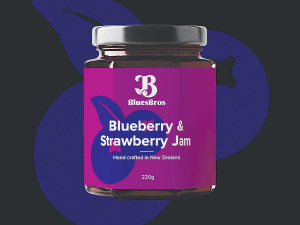Blueberries tipped for bumper season
Blueberries are likely to have a bumper season as the warmer El Niño weather pattern arrives in New Zealand ahead of peak blueberry season in mid-January.
 The Bluesbros brand’s products include a blueberry jam, chutney sweet sauce, balsamic drizzle and a blueberry and strawberry jam.
The Bluesbros brand’s products include a blueberry jam, chutney sweet sauce, balsamic drizzle and a blueberry and strawberry jam.
A family business growing blueberries for more than 40 years is taking its health food offering to the next level.
The Furniss family is partnering with local companies to launch crafted blueberry foods and beverages.
Their Bluesbros brand was launched late last year. The first products to market include a blueberry jam, chutney sweet sauce, balsamic drizzle and a blueberry and strawberry jam.
The company followed this with a single-source Solomon Islands chocolate that contains freeze-dried New Zealand blueberries.
Its beverage offering includes a blend of blueberries and other NZ fruits: 100% blueberry juice, blueberry and Hawke's Bay gala apple juice and blueberry & NZ lemon juice.
All the juices use only NZ fruit, have no preservatives, no artificial flavours, are not made from concentrate, have no added sugar and are rich in fruit pulp.
All the blueberries are sourced from Blueberry Country, a business the family acquired in 1990.
Blueberry Country chief executive Jerem Wylie, who joined the company 20 months ago, told Hort News that more Bluesbros products are on the way - as part of the company's plan to take the business "to the next level".
"Diversifying our offerings and developing new markets both locally and off shore are all options we would like to explore," Wylie says.
"We currently have a number under consideration, with the second tranche of new products due to hit the market around late April."
Bluesbros has partnered up with local companies who Wylie describes as specialists in their field and passionate about producing good, wholesome, high quality products. He says the plan is to target the local market first before exporting.
"We are initially targeting the NZ market to ensure we have the products, range and quality matched up with what our consumers are looking for," he says. "Then we may look to expand distribution to other end markets outside NZ once we are comfortable that we have achieved this."
Wylie believes that being able to enhance the company's businesses performance through diversification and value add is important.
"We also want to give consumers additional opportunites to enjoy blueberries outside the traditional fresh and frozen whole fruit options," he says.
"Consumers want to know more about where their food comes from and want less processing done to it. We believe this should be key in our decision making when it comes to new product development."
Blueberries are referred to as a super food - liked by people for their antioxidant properties.
Wylie believes the blueberry industry in NZ is well supplied for the summer period and the industry is endeavouring to make NZ-grown fruit available for more of the year.
"NZ has a great opportunity to open up new markets on the back of the high regard people hold for our country and the food we produce," he adds. "This may be everything from fresh and frozen whole fruit to nutraceutical powder and ingredients."
Nature's Superfood
Blueberries are often touted as nature's superfood.
They contain significant amounts of dietary fibre and vitamin C.
Blueberries are full of antioxidants, including anthocyanins - compound that give blueberries their blue colour.
Blueberries contain a higher range of anthocyanins compared to most other berries. The antioxidants in the berries may lower risk of a whole host of illnesses by limiting inflammation and fighting free radicals.
The flavonoids in blueberries are said to possibly reduce risk of cognitive decline and dementia by enhancing circulation and protecting brain cells from damage.
Some studies have linked eating blueberries with decreased blood pressure. Since they are high in polyphenolic compounds, which have been associated with improved cardiovascular risk profiles, blueberries are described as a cardioprotective food.
The World Wide Sires National All Day Breeds Best Youth Camp Best All Rounder plaudit has become family affair, with 2026 Paramount Cup winner Holly Williams following in her sister Zara's footsteps.
DairyNZ is giving New Zealand farmers a unique opportunity to gain hands-on governance and leadership experience within the dairy sector.
Herd improvement company LIC has posted a 5.2% lift in half-year revenue, thanks to increasing demand for genetics.
According to the latest Fresh Produce Trend Report from United Fresh, 2026 will be a year where fruit and vegetables are shaped by cost pressures, rapid digital adoption, and a renewed focus on wellbeing at home.
The Roar is a highlight of the game hunting calendar in New Zealand, with thousands of hunters set to head for the hills to hunt male stags during March and April.
OPINION: The past few weeks have been tough on farms across the North Island: floods and storms have caused damage and disruption to families and businesses.

OPINION: Meanwhile, red blooded Northland politician Matua Shane Jones has provided one of the most telling quotes of the year…
OPINION: This old mutt has been around for a few years now and it seems these ‘once in 100-year’ weather…